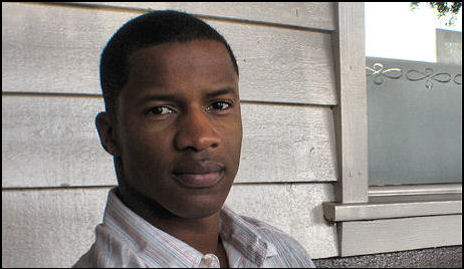I’ve noticed an interesting difference between a late work-print version of Denzel Washington‘s The Great Debaters that I saw a few weeks ago and the release- print version that I saw last night at Harvard University. It’s a big change regarding the fate of Nate Parker‘s Henry Lowe character — the most charismatic and gifted Wiley College debater, although one with an occasional weakness for booze and women.

Nate Parker, snapped during a West Hollywood HE interview in late November
In the work-print version of the epilogue crawl (i.e., the what-happened-to-the- characters info that fact-based dramas often supply), it said that after graduating Lowe simply disappeared — an indication that he may have succumbed to his addictions, etc. It seemed like an interesting call since inspirational films usually pass along uplifting information, blah blah. Lowe is a composite character (i.e., not based on a specific real-life figure) so Washington was free to write any fate he chose. Saying that Lowe didn’t build upon the potential of his early life was, at the very least, against the grain and admirable for that.
But this dark-fate decision, apparently, didn’t go down with research audiences. In the final-release version, it is said that Lowe went into the ministry — an obvious hint that he turned to God and the cloth as a way of controlling his demons. A more upbeat and positive fate, yes, but an indication of a certain artistic flexibility on Washington’s part. This is a small thing I’m mentioning. The Great Debaters is still sharply written, forthright, not sappy, well-shaped. It’s “commercial” and likely to catch on. (Probably.) It’s just that conveying Lowe’s downbeat fate added an interesting counter-shade.
The good-looking Parker gives the most vivid performance in The Great Debaters. He comes off as confident, centered…settled into himself. The guy most likely to get a bounce off this film, I’m betting.
The only real-life, history-based debater in the film is James Farmer, Jr. (Denzel Whitaker), who went on in real life to found the Congress of Racial Equality and become a major civil-rights movement leader.









